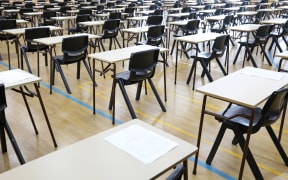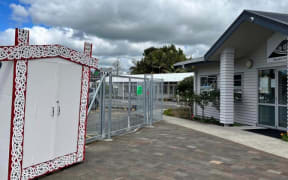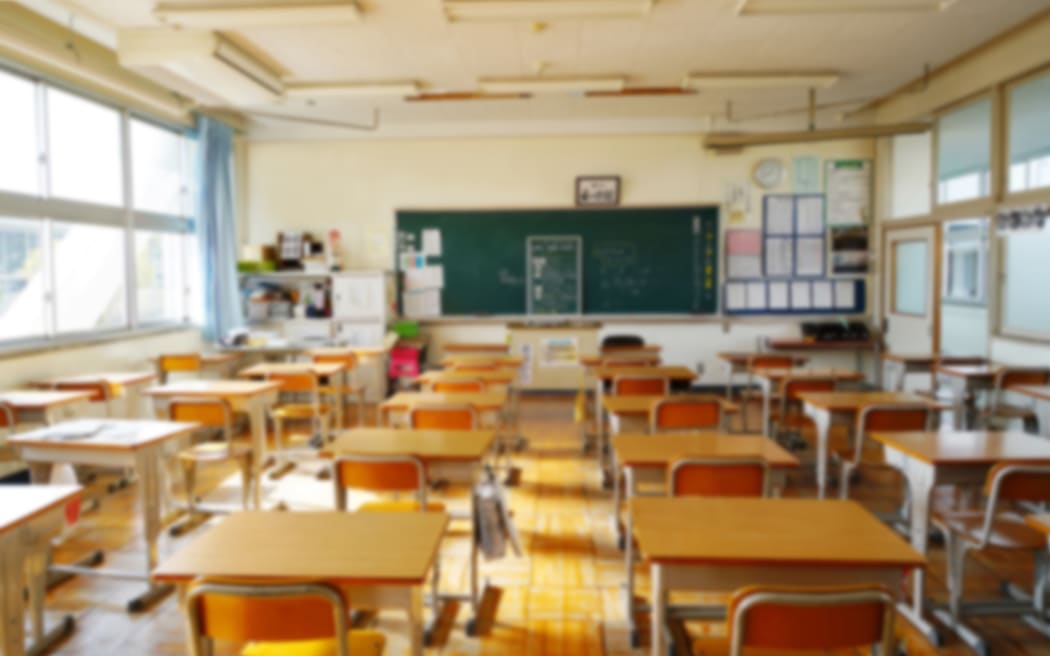
Two-thirds of teachers say disruptive behaviour in the classroom has a big impact on students' enjoyment of school. File photo. Photo: 123rf
National action is needed to rein in critical levels of violent and disruptive behaviour in schools, says the Education Review Office.
The schools' watchdog says the situation is so serious it warrants a national approach, and the Education Minister says the government is "taking action" to turn around the behaviour.
In a report out on Thursday half of teachers surveyed by the office say disruptive behaviour has become worse in the past two years and a quarter of principals have seen students physically harm others, and damage or take property, at least every day.
Three-quarters of teachers say disruptive behaviour affects students' progress and two-thirds say it has a big impact on students' enjoyment of school.
ERO Education Evaluation Centre head Ruth Shinoda told RNZ the review office was very concerned about the situation.
"It's been bad in New Zealand for a long time, but it's got worse over the last two years," she said.
"The levels of it have got so much worse that teachers are raising it and saying it's getting in the way of teaching. Half of teachers are spending nearly an hour a day responding to behaviours. If you add up that time it's like half a term a year of teaching time just spent on managing behaviour.
"We know that the classrooms which have got the worst behaviour also have the worst achievement, so it's really getting in the way of students achieving."
Shinoda said there was no single cause for the increase in poor behaviour, which was also happening in other countries.
"It's a combination of technology, stresses on kids and of course some of the anxieties that have come after Covid and that plays out in behaviour.
"Schools in New Zealand, everyone has their own policies, we have a very devolved system so there's a reasonable amount of inconsistency and that means it's quite hard to get parents and schools on the same page about expected behaviour."
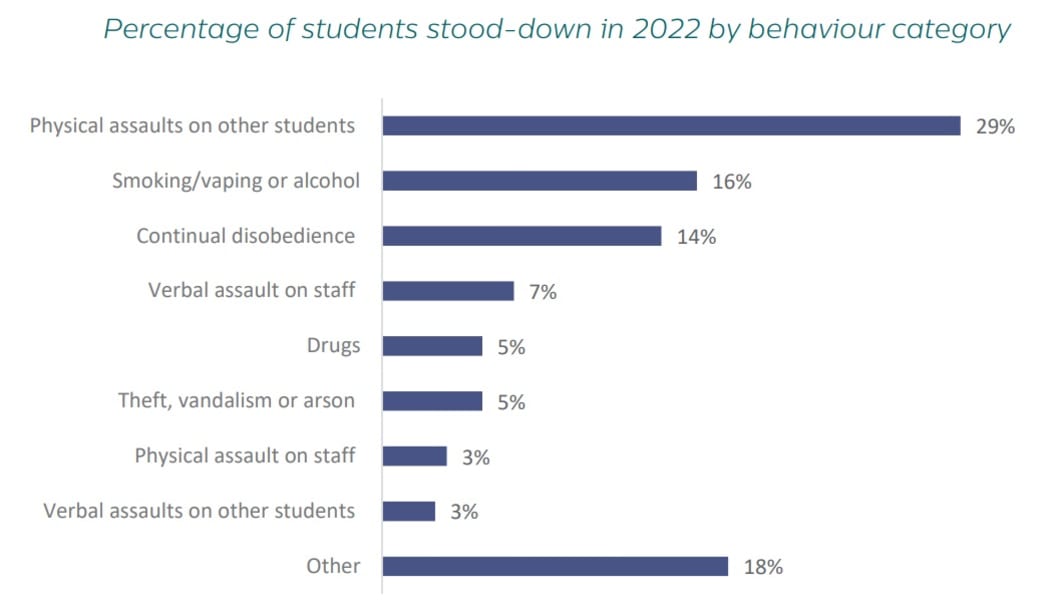
Photo: Supplied
Suspensions a last resort
The report recommended prioritising classroom behaviour and supporting all schools to prevent, notice and respond to challenging behaviours.
"This needs to include a more consistent set of expert supports and programmes for schools, based off a stronger evidence base of what is effective," it said.
The report said schools needed more accountability and clearer expectations, greater efforts to prevent bad behaviour, more support and training for teachers, and effective consequences for badly-behaved children.
But the report also said suspensions should remain a last resort.
It said effective practices for managing children's behaviour included teaching and supporting good behaviour, and knowing students and the way they behaved.
It also identified "clear and immediate feedback to correct minor challenging behaviours like talking at inappropriate times, as well as logical consequences for more serious or recurring behaviours".
Talking inappropriately was the most common misbehaviour cited by teachers, followed by distracting others and refusing to follow instructions.
The report said 83 percent of teachers saw students talking inappropriately at least every day, with 52 percent seeing it every lesson or hour.
More than 80 percent saw students distracting one another at least every day and 51 percent saw it every lesson or hour.
"Disrupting the learning of others… includes a whole range of things from being off task, falling out, chatting with somebody else near where you are or down the classroom, it could be throwing things. There's a whole variety that fits under that," a deputy principal told the report's authors.
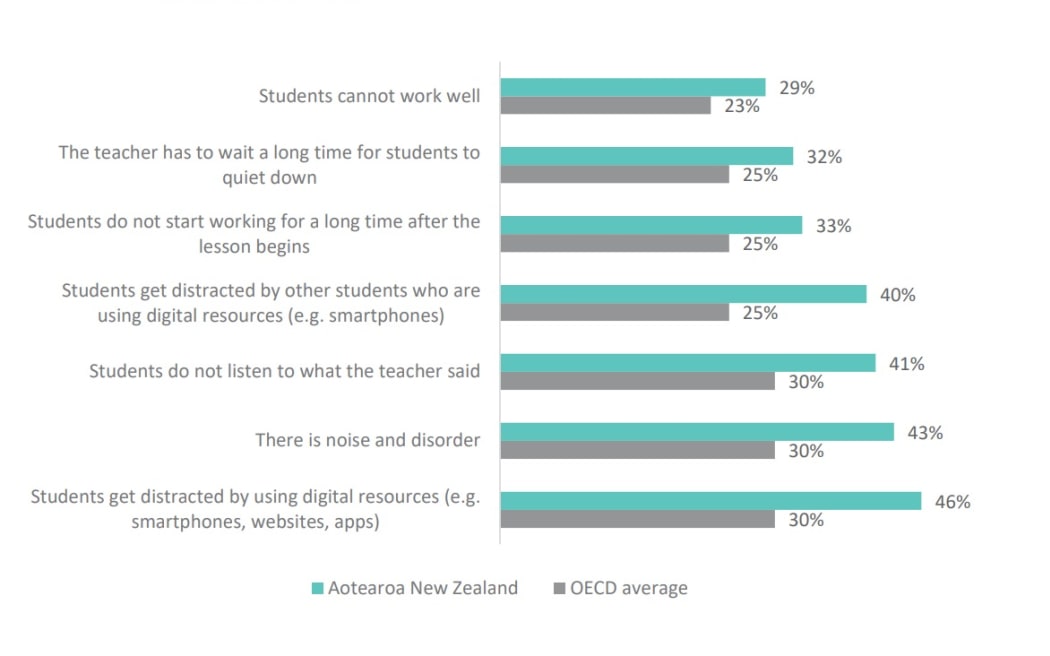
Photo: Supplied
Students come with 'extreme violence with no empathy'
Three out of four teachers (73 percent) experienced students refusing to follow instructions every day and 40 percent of teachers saw that behaviour every lesson/hour.
The report said 32 percent of teachers and 23 percent of principals experienced students damaging or taking property every day.
"In focus groups with teachers, students, and parents, we heard examples of behaviours that involve damaging or taking property. Teachers raised concerns about students throwing objects in class, such as chairs and kicking tables," the report said.
It said 21 percent of teachers and 26 percent of principals experienced students physically harming one another every day.
"We heard that these behaviours are extremely challenging and involve aggression, physical and extreme violence, and fighting with other students," the report said.
"We've had children come in [to school] with extreme violence with no empathy," a principal told the report's authors.
"Going straight to physical violence from nothing. Like there is no verbal violence that happens first - it's straight to punching or hitting or grabbing. And our data shows that there's been a huge increase in those two behaviours over the last three years," a teacher said.
The report said primary school teachers were more likely to see physical harm than secondary teachers and distracting behaviours were more frequent in secondary schools than in primary schools.
Disruptive behaviour was more common in larger schools and in schools in lower socioeconomic communities.
The reported included data from the OECD's 2022 international study of 15-year-olds that showed New Zealand teens reported classroom disruption at higher rates than students in other countries.
The PISA study found 29 percent of New Zealand students said they could not work well in most or all lessons compared to the OECD average of 23 percent and 41 percent said students did not listen to what the teacher said (OECD average: 30 percent).
Government response
In a statement the Minister of Education Erica Stanford said improving student behaviour was "critical to lifting achievement and ensuring every student receives a world-class education".
She said the government was already taking action on two of the recommendations - banning cell phones in classrooms and looking how it could improve teacher training
She said she would be following up with the ministry on how the report's recommendations - including better training for teachers, a national approach to behaviour and having clear guidance on having effective consequences for poor behaviour- to see how they could be speedily progressed.


